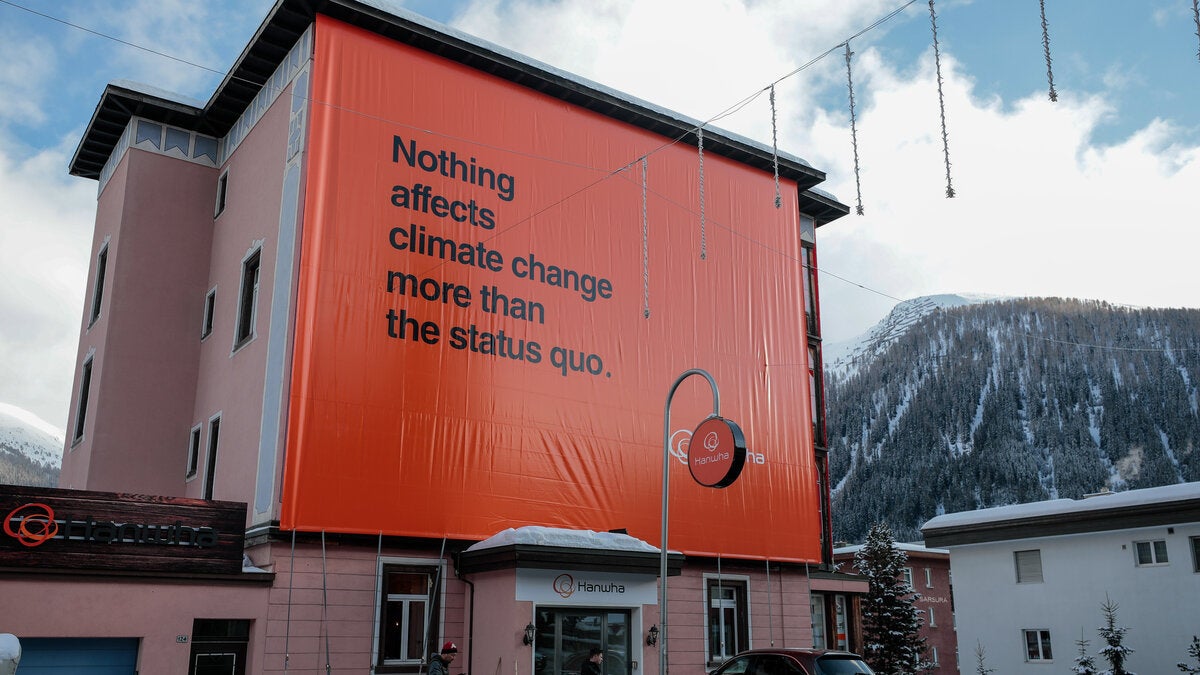The global ad industry now has one of the most important briefs in history: tackling the climate crisis

“Saving our planet is now a communications challenge,” said Sir David Attenborough, renowned broadcaster and naturalist, about the climate crisis. While the science is well understood, and we know how to act, what’s trickier is encouraging more of humanity to slash its emissions and adopt low-carbon lifestyles. This is where advertising has the power to bring about real change.
Creatives from London to New York are past masters at creating empathy, connecting consumers to brands, influencing moods, thoughts and decisions. They’ve done it for the last 70 years, driving demand for a panoply of products from cars to flights, phones to TVs, with little concern for the emissions generated by the sale of these goods. There are those now calling for the sector to act.
“It’s time to use the ad industry’s superpower in a more enlightened way. We must help businesses bring low-carbon products to market and inspire people to buy them. Changing behaviours requires more than attitude change, it requires shifts in how we live our lives. We also need to create inspiration, not shame. Motivation, not criticism and reward, not punishment,” explains Anna Lungley, chief sustainability officer at Dentsu International.
The reason why the ad industry exists at all is because of its ability to convince us to consume. It’s why the International Panel on Climate Change, earlier this year included, for the first time, a special plea aimed at our insatiable consumptive behaviour and the need to boost demand for low-carbon products. The prize could be a massive reduction in global carbon emissions.
“Yet a lot of companies are scared to take the lead. They’re caught between being accused of greenwashing and being blamed for not doing enough. So, there’s this widespread failure to lead,” says Bill Alberti, managing partner, human truths at Interbrand.
Recalibrating the ad industry
Looking at advertising through a different lens could help. Today, the gauge of success or failure is determined by whether more or less is sold. Yet Earth’s resources are finite. This must shift to a ‘better or worse’ pattern of consumption, where products are better for the planet, better for consumers and better for the companies that sell them.
“Brands need to drive demand for better choices, we all want to make the planet better, not worse. Brands therefore need to help people feel good about the differences they can make,” adds Alberti.
Attitudes can be changed. Rewind 10 years and only 14% of Brits wanted to watch the Paralympics. By the time Tokyo hosted the event last year, a third of the population tuned in. Credit goes to Channel 4’s Superhumans TV advertising campaign, showing the herculean achievements of Paralympians in overcoming barriers. This revolutionised perceptions of disabled people.
What advertisers should think about is inspiring people around their potential to be part of the solution
Other issues tackled by the industry include those on drink-driving, female empowerment and tackling diversity or mental health issues. “Over the last few decades, the sector has cracked similar briefs and has proven to be a powerful tool for driving social and behavioural change,” says Mark Howley, COO of Publicis Media UK.
Patagonia, an example of best practice touted for years, is famous for telling consumers: “Don’t buy this jacket.” IKEA’s Activists Without Knowing It campaign linked activities in the home with environmental data to show that it’s easy to live sustainably. Circular economy brands such as Vinted now advertise a hassle-free, high-fashion lifestyle that is rewarding but doesn’t cost the Earth since clothes are secondhand and shared, not thrown away.
The challenge with climate change and humanity’s wholesale consumption of the planet’s resources is that most consumers are just that: consumers, not scientists. Breaking down complex science into simple, bite-sized messages with calls to action that brands can influence and consumers can put into practice every day is crucial.
Ads that aspire to climate goals
Making sustainable behaviours aspirational is now a key objective. But for many apathetic or ecosceptic consumers, communicating that sustainable choices can sometimes save consumers money is likely to be the stronger message, especially with the cost-of-living crisis and a looming global recession.
The issue that businesses are now grappling with is how to make purpose a fundamental part of how they operate and how this translates into advertisements. Brands are struggling with the same questions that consumers face: how can they empower themselves and turn guilt into positive action? How can frugality power a company’s bottom line?
“A lot of messaging we receive from brands, Greta Thunberg or from a judgemental vegan at a dinner party, feels like a series of fingers are being wagged at us for being part of the problem. What advertisers should think about is inspiring people around their potential to be part of the solution,” says Will Sansom, head of strategy at The Brooklyn Brothers.
“This requires us to break free from traditional tropes of responsibility and duty and being sensible. Who said advertising about climate change needs to feel heavy? If we can make it relatable, fun and even light-touch, we could start seeing a real step-change.”
Making people feel positive and proud about the sustainable choices they make is likely to be a new mantra for the ad industry. It helps that the sector is ruthlessly results-driven. If brands see customers positively responding to the changes they’re making, they’ll make more. This will encourage a virtuous circle, yet brands will have to do the heavy lifting for consumers.
“For the ad industry the answer is to make people feel smart and positive about intelligent spending, mastering new upcycling skills, and positioning mindful consumption as a new status signal,” states Michela Graci, strategy partner at Coley Porter Bell.
The industry has a way to go. When all the ads for Black Friday promote Green Friday instead, we’ll know things have really changed.
The global ad industry now has one of the most important briefs in history: tackling the climate crisis

“Saving our planet is now a communications challenge,” said Sir David Attenborough, renowned broadcaster and naturalist, about the climate crisis. While the science is well understood, and we know how to act, what’s trickier is encouraging more of humanity to slash its emissions and adopt low-carbon lifestyles. This is where advertising has the power to bring about real change.
Creatives from London to New York are past masters at creating empathy, connecting consumers to brands, influencing moods, thoughts and decisions. They’ve done it for the last 70 years, driving demand for a panoply of products from cars to flights, phones to TVs, with little concern for the emissions generated by the sale of these goods. There are those now calling for the sector to act.





